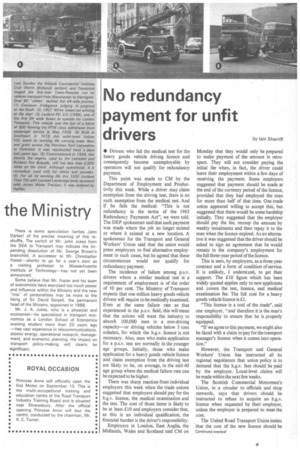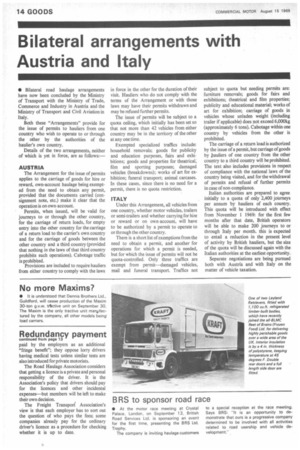No redundancy payment for unfit
Page 15

Page 16

If you've noticed an error in this article please click here to report it so we can fix it.
drivers by lain Sherriff
• Drivers who fail the medical test for the heavy goods vehicle driving licence and consequently become unemployable by operators will not qualify for redundancy payment.
This point was made to CM by the Department of Employment and Productivity this week. While a driver may claim exemption from the driving test, there is no such exemption from the medical test. And if he fails the medical: "This is not redundancy in the terms of the 1965 Redundancy Payments Act", we were told. The DEP spokesman said that such payment was made where the job no longer existed or where it existed at a new location. A spokesman for the Transport and General Workers' Union said that the union would press employers to find alternative employment in such cases, but he agreed that these circumstances would not qualify for redundancy payment.
The incidence of failure among p.s.v. drivers where a similar medical test is a requirement of employment is of the order of 10 per cent. The Ministry of Transport expects that one million heavy goods vehicle drivers will require to be medically exarnined. Even at the same failure rate as that experienced in the p.s.v. field, this will mean that the unions will want the industry to absorb 100,000 men in a non-driving capacity—or driving vehicles below 3 tons unladen, for which the h.g.v. licence is not necessary. Also, men who make application for a p.s.v. test are normally in the younger age groups. Initially, those who make application for a heavy goods vehicle licence and claim exemption from the driving test are likely to be, on average, in the mid-40 age group where the medical failure rate can be expected to be higher.
There was sharp reaction from individual employers this week when the trade unions suggested that employers should pay for the h.g.v. licence, the medical examination and the test. The cost of those items is likely to be at least £10 and employers consider that, as this is an individual qualification, the financial burden is the driver's responsibility.
Employers in London, East Anglia, the Midlands, Wales and Scotland told CM on Monday that they would only be prepared to make payment of the amount in retrospect. They will not consider paying the initial fee when, in fact, the driver could leave their employment within a few days of receiving the payment. Some employers suggested that payment should be made at the end of the currency period of the licence, provided that they had employed the man for more than half of that time. One trade union appeared willing to accept this, but suggested that there would be some hardship initially. They suggested that the employer should pay the fee, recoup the amount by weekly instalments and then repay it to the man when the licence expired. As an alternative it was suggested that the driver should be asked to sign an agreement that he would remain in the company's employment for the full three-year period of the licence.
This is seen, by employers, as a three-year contract and a form of condition of service. It is unlikely, 1 understind, to get their support. The £10 figure which has been widely quoted applies only to new applicants and covers the test, licence, and medical examination fee. The full cost for a heavy goods vehicle licence is £1.
"This licence is a tool of the trade", said one employer, "and therefore it is the man's responsibility to ensure that he is properly equipped.
"If we agree to this payment, we might also be faced with a claim to pay for the transport manager's licence when it comes into operation."
However, the Transport and General Workers' Union has instructed all its regional negotiators that union policy is to demand that the h.g.v. fees should be paid by the employer. Local-level claims will be made within the next few weeks.
The Scottish Commercial Motormen's Union, in a circular to officials and shop stewards, says that drivers should be instructed to refuse to acquire an h.g.v. licence when requested by their employer, unless the employer is prepared to meet the cost.
The United Road Transport Union insists that the cost of the new licence should be
paid by the employers as an additional "fringe benefit"; they oppose lorry drivers having medical tests unless similar tests are also introduced for private motorists.
The Road Haulage Association considers that getting a licence is a private and personal responsibility of the driver. It is the Association's policy that drivers should pay for the licences and other incidental expenses—but members will be left to make their own decision.
The Freight Transport Association's view is that each employer has to sort out the question of who pays the fees; some companies already pay for the ordinary driver's licence as a procedure for checking whether it is up to date.






































































































